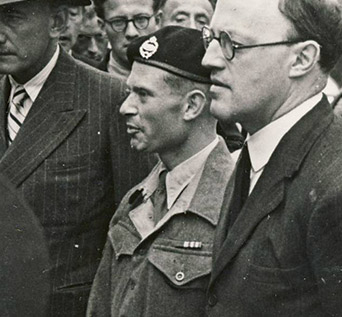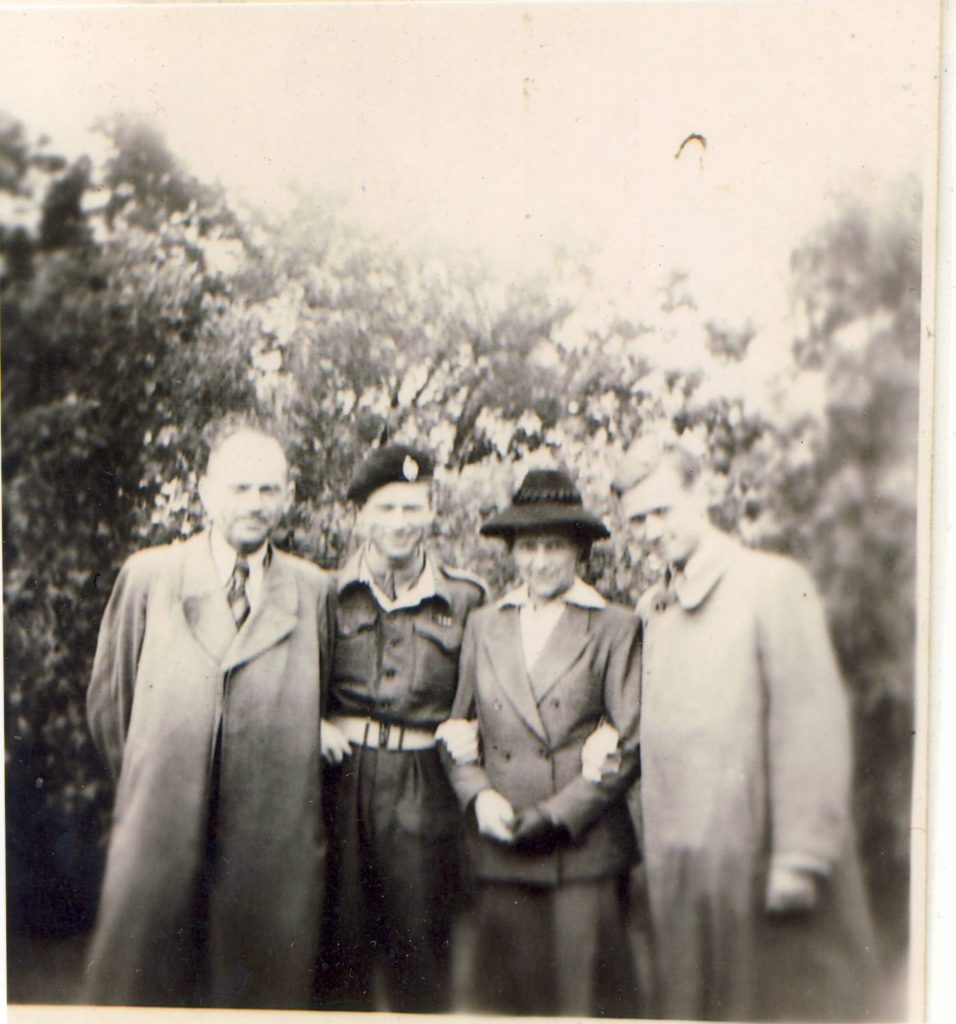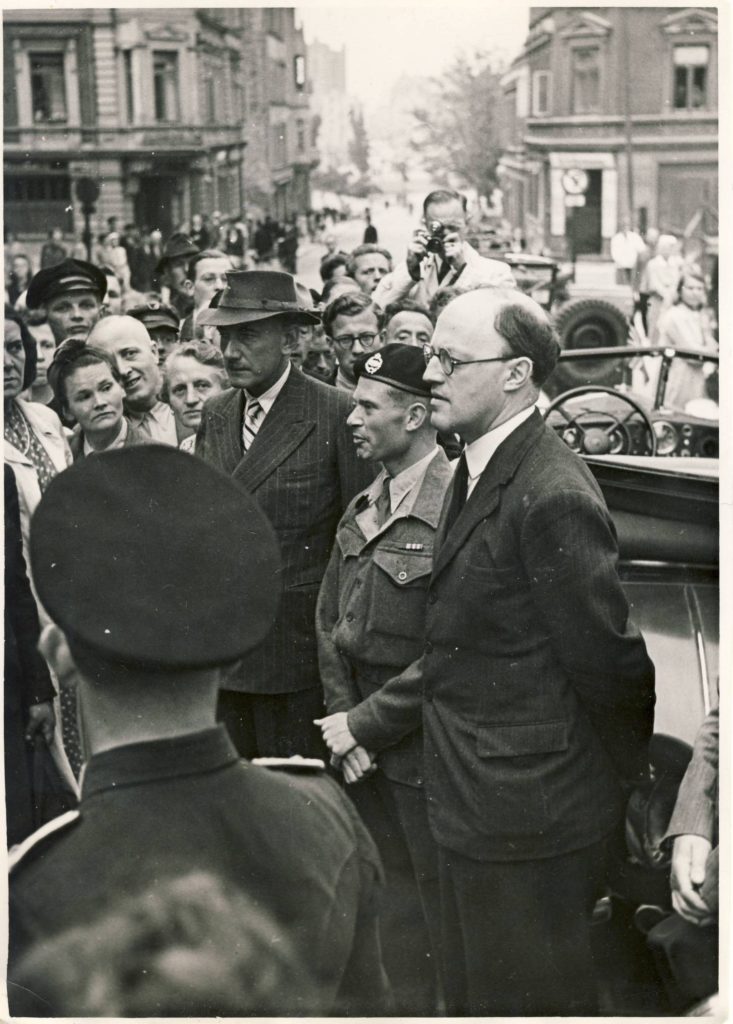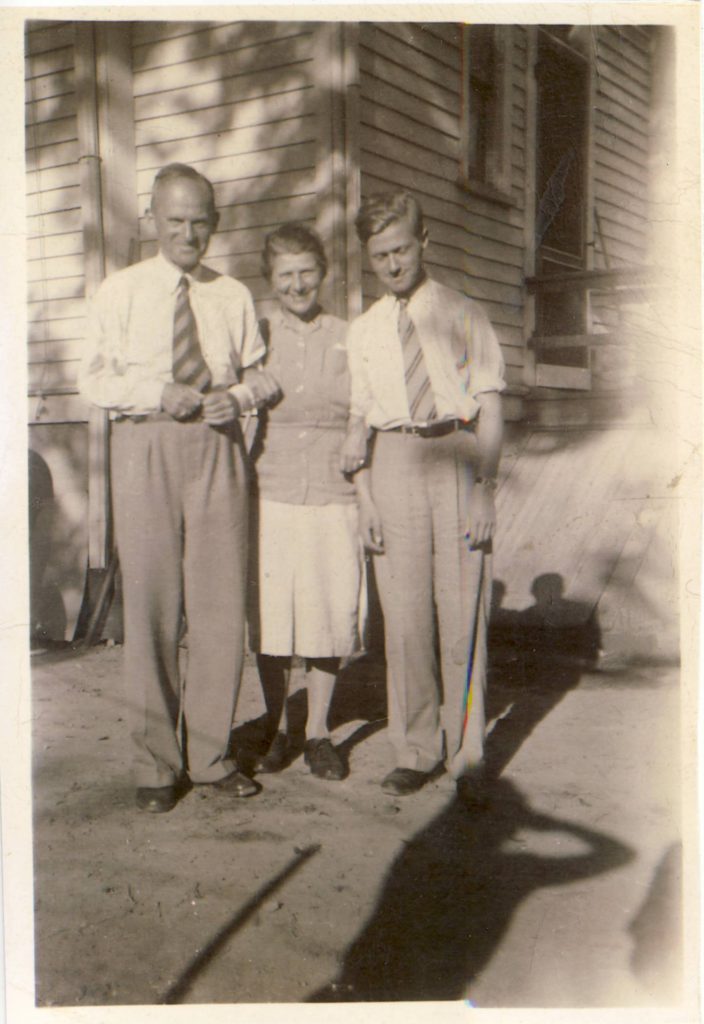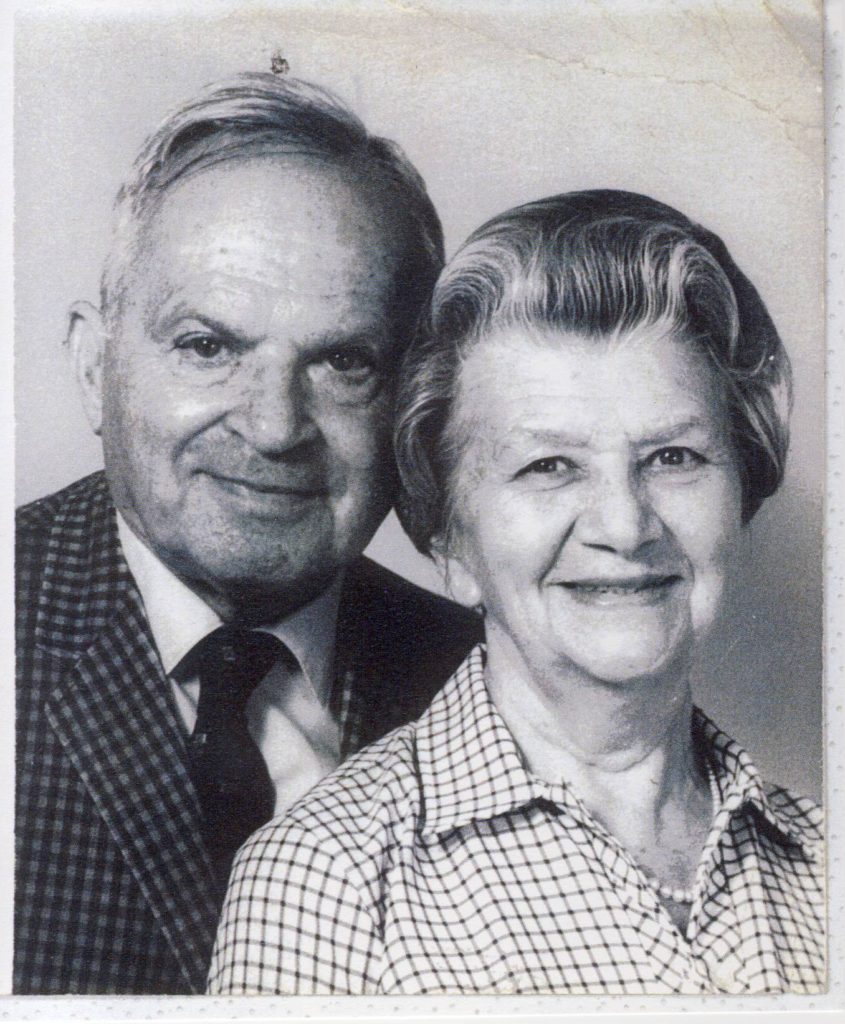…June of 1946. And, I was demobilized sometime shortly after that and I went back to England for a few months and I was trying to get a visa to come to the United States and join them, and I managed to get that. And I got passage which was not too easy to get in those days. There weren’t too many ships for passengers. And, so in November of 1947, I came to the United States and came to St. Louis to join them, and so, since then, we have been living in the same city and sort of taken up our normal family life again.
EIDELMAN: What about your brother?
WILDE: My brother is now a full professor at the University of Minnesota. He’s married.
EIDELMAN: Does he come to St. Louis?
WILDE: Yes, he came to St. Louis with them. He finished his studies here at Washington U. Then he went to University of Wisconsin and got his Ph.D. and has been at Minnesota now for – gee, yes, almost 20 years. My brother, incidentally, is not Jewish. He married a gentile girl from Milwaukee and he raised his family – his family has been raised Christian.
EIDELMAN: While you and he were both living in St. Louis, did you and your brother have discussions about why he wanted to be Jewish or why he didn’t want to be Jewish; rather why you did want to be Jewish?
WILDE: Yes, in a way. I mean, he understood the reasons. I don’t know that we particularly sat down and discussed it. It was, you know, quite clear to me why because – and I didn’t mention this before – O.K., what had happened when we were children growing up, of course, we were both equally religious and non-religious, whatever it was we shared. We had in our very early childhood we had our Christmas tree and then later on we celebrated Hanukkah and whatever. So, there was certainly no difference. One of us didn’t decide to be Jewish and the other not Jewish. And, I suppose it would have stayed that way except my brother became very close to a Protestant pastor in the neighborhood in Berlin where we lived. This gentleman’s son had been actually a school friend of mine, and I guess they kept in touch, and then there were younger children, I think – maybe one of the younger children might have been a classmate of my brother’s too. And then there was a daughter – at least one daughter, maybe more. Anyway, they were a very, very fine family and they sort of gave him the support and the normalcy that he needed as a young boy growing up, which he couldn’t get in his own home because of the situation being what it was. At home, you know, it was constant tension. It was a fight for survival and there was this pastoral family living a relatively normal life and being extremely supportive of him, giving him the recreation that he needed, giving him ideas and thoughts that had nothing to do, you know, with the immediate urgency of survival or going to work the next day, and that sort of thing. So, he needed that very badly, and as time developed it became an emotional attachment. I think he became quite attached to the girl and, uh…
EIDELMAN: Which girl?
WILDE: The daughter, the Pastor’s daughter. And so, it was almost inevitable, and he was so impressed by the Pastor – his name was Von Rabenau – I can’t remember his first name – that he, himself, I think, expressed a wish to become a Pastor. So had he stayed in Germany, he probably would have (LAUGHTER) become just that.
So, that it’s not surprising. As I say, I understand what made him do this, how he became so attached to Christianity, that it was not really necessary to sit down and have a particular discussion about it. So, he married and raised a family of – in the Christian faith, and of course I married, and my family is raised in the Jewish faith, and we get along just beautifully; (LAUGHTER) we have no problems with that – none whatsoever that I am aware of.
EIDELMAN: How do you feel about the German people now, versus how do you think that he feels about them?
WILDE: Well, I have never felt any great hatred for the German people because I really have no reason to. I know of enough non-Jewish Germans who have, you know, done more to help their fellow men than perhaps some Jewish Germans might have done. So, from that respect, I never did feel any hatred against an entire people. I did my bit to bring about the downfall of the Nazi regime, and that was where my hatred was directed, and still is. Anything else, I would say is you know, it’s redundant. We have been back to Germany – I have been back to Germany many times, partly on business and partly on vacation. I have taken my family to Germany and we have always enjoyed it. We have – uh – in the beginning I have tried to have talks with Germans about the situation. Certainly, when I was in the military government I had many talks and at that time, of course, it was still very fresh and people were still participants. Now when you go, you know, you find people who have really only read about it in books, if they’ve heard about it at all.
I want this to be kept alive. I want people to know what happened and I’m very much impressed that in Berlin, again in particular, there are still innumerable memorials to the Holocaust, so that, you know, it is not being swept under the rug. And, right in the middle of the Wittenburg Platz, which is the center of the shopping district there at the beginning of the Kurfustendamm where the Kauf des Westenf (KDV), the big department store, there is a big bronze, brass rather, memorial plaque listing all of the names of the concentration camps. And then there is the Jewish Community House, and the Furzon Strausse, which at one time had been a synagogue of which only the entrance portal is left, and the rest of it has been rebuilt as a very modern structure. And, there is a very large memorial in there which is, I suppose, visited mostly by Jewish visitors, I must say.
In East Berlin, of course, there is a lot more recognition, I guess, of victims of Fascism. I mean, they do this sort of on – by rote. I mean, they have rallies and they have memorial commemorative meetings and that sort of thing. There is this big former armory, I guess, that is now a memorial to the victims of Fascism and so forth. So, there is still a great deal, I mean you don’t really feel that this is all 40 years ago. I mean, you still feel that it’s very much part of the present scene. How much the average German really concerns himself with it, I do not know. I do know that many people have benefitted very greatly from the monetary compensation they have received. I mean, most of our older people have had a relatively comfortable old age because of the Wiedergutmachun (the restitution) that the German government has provided and is still providing.
EIDELMAN: Did your mother and father, or did you personally receive any reparations?
WILDE: I myself have not, but my father does, yes. He does (a) for the loss of his business and (b) I guess he receives a certain amount of social security as a result of having been an employee for X number of years and so forth. He made a lump sum back payment which entitled him to a pension. My mother-in-law likewise, Eve’s mother, receives a rather nice monthly stipend from the German government in restitution and also her social security. So, both of these – I mean, this is now in my own immediate family – both of these families have been able to live a comfortable old age because of the money that they have – they are still receiving from Germany.
EIDELMAN: How did you meet your wife?
WILDE: I met my wife right here in St. Louis.
EIDELMAN: Is it a coincidence that…?
WILDE: Yeah, absolutely, it really was. I met her shortly after I came to St. Louis. There was a self-aid organization of Jewish refugees in St. Louis, and my folks thought it would be nice if I went to some of those meetings to meet some of the other people from Germany. And that’s where I met her, and so she, she offered to show me around and take me to a concert or something, and that’s really how it all got started. We both, we both happened to be from Berlin. She, of course, is quite a bit younger than I. She left Berlin when she was quite young – she was 11, I guess, or nine.
EIDELMAN: Did you speak German at that time? Did you speak German to her?
WILDE: Did I speak German to her? I have never spoken German to her. No, (LAUGHTER) we never speak German to each other. I speak German to my parents but I do not speak German to her, nor do I speak German to my mother-in-law, as a rule. We have certain people (LAUGHTER) we speak German to and certain people we don’t. No, we don’t.
We were in Berlin just a couple of months ago and tried to look up some of the places where we had lived. We found the apartment where Eve had lived and well, the buildings where we had lived were all bombed out, so they weren’t there anymore. But, it’s quite a kind of nostalgic thing to do – to go back and try to retrace your steps. My daughter was with us. She was anxious to see some of her roots. I don’t know that we found any roots or not, but she did enjoy, I think, going through this with us. We took some pictures of houses where some of our friends had lived and asked us to bring a picture back with us, and so forth.
EIDELMAN: Do you have any friends who are still living in Berlin?
WILDE: Yes, well except, outside of my cousin whom I mentioned, we looked up an old couple of friends of my father’s and mother’s really – not ours so much, although we knew them when we were children. It was another one of my father’s ex war buddies. They live in East Berlin. They are now in their 90’s, at least the gentleman is, I think. His wife is almost 90, and it was quite an emotional visit. We did manage to look them up and we spent a couple of hours with them. They are not Jewish.
EIDELMAN: When jumping way back to when you were young in Berlin, during your school years, did you have any close non-Jewish friends?
WILDE: Uh, – no, no, not really, I don’t think. It was just – I don’t know why, I mean it would have perfectly all right in the very early stages. No one really thought about Jewish or otherwise. I think most of my friends, my close friends, were always Jewish. I know when we had birthday parties we generally had some non-Jewish friends also but they were not as close as my Jewish friends were, and those that I really (PAUSE) palled around with, I think, were all Jewish.
EIDELMAN: Do you recall whether intermarriage at that time was socially acceptable?
WILDE: At what time?
EIDELMAN: Let’s say when you were in high school.
WILDE: Well, at that time things had already gotten to the point where it was already lawfully not possible.
EIDELMAN: Right. (INTERRUPTING ABOVE) Let’s say prior to that. Was there much mixed marriage?
WILDE: Well, as I told you, at the time that my parents got married, it was probably not – well it was not uncommon because obviously there were quite a few, you know, those who were in Berlin during the war were all mixed marriages. And there were quite a number of them. I would say that many families frowned on it – perhaps the Jewish part of the family more so than the Christian part, at least in a lot of cases, just probably as it is today. I don’t really think it’s changed all that much. Later, in the late 20’s, my guess is that it really wasn’t frowned upon so much by anyone at that time, but I’m strictly guessing – I really don’t know.
EIDELMAN: What are – do you have any relationships with your mother’s side of the family now?
WILDE: Well, there’s hardly anybody left. My mother is quite up in age now. She’s over 90. She only has, I believe, two brothers still living, one of whom is considerably younger than she is. He is just 70 and she is in touch with him now more than she had been for a long time. I mean, there’s been quite a reconciliation and this younger brother whom she hardly knew because he was so much younger than she and I think she had already moved away from home and, I guess, practically gotten married. He was still a child. But, he writes to her quite frequently and she writes to him, and, you know, lately they’ve even taken to calling each other on the telephone for somebody’s birthday or something, so there is – there is a tie there.
EIDELMAN: Do you ever have any…?
WILDE: I have not…
EIDELMAN: …discussions with him?
WILDE: I have not visited him. Oh, several years ago I happened to be in Frankfurt on business – they live in Weisbaden still, which is not too far from there. I picked up the phone and called and talked to him, you know, briefly, but it was not possible for them to come to Frankfurt, nor was it possible for me to go to Weisbaden to visit. My brother was there last year. He was in Germany and he made a point of stopping to visit with them and he had apparently a very good visit. As a result of that, I think, is now these telephone calls now and so forth, I mean, a closer feeling between the brother and the sister.
There is another brother living but we really don’t know much about him. I think all of the rest have since died. The sister who was in France – in fact, she was the closest to us, I guess, at the stage back in 1933 when we were there. She was the German speaking announcer on the radio station in Strausborg which is sort of a mixed lingual city, partly French, partly German, partly Alsacian, just neither one or the other. Anyway, she was the German speaking announcer, and as such, of course, she had access to a lot of news that the average person might not have. So, she was interesting to talk to, she knew what was going on and she was sort of a soulmate at the time. I think later on things changed a little bit and both she and her husband, for whatever reason, I think sort of withdrew from the opposition to Nazism and sort of became quiescent if nothing else. So, we sort of lost touch with them after that.
EIDELMAN: Let me ask you about the Olympics in Berlin, in 1936. What do you recall about that?
WILDE: Well, I remember them, you know, as being one of the big events.
EIDELMAN: How did it feel to be Jewish during the Olympic period?
WILDE: If you had to be Jewish, I guess (LAUGHTER) during the Olympics was about the best time because everyone was on their best behavior. You know, they had these – they called them Sturmer Boxes on the street corners, which was a bulletin board where the Sturmer, which was a rabidly anti-Semitic newspaper, was published, and you could stop at any street corner you liked and read the latest anti-Semitic diatribes. During the Olympics, all of these boxes had been removed and so, you know, everyone was – was being pretty good at that time. I remember it as being, you know, a big sporting event. It was a great, a great thing at the time, a lot of publicity. Berlin was in the spotlight and there were, you know, photos of the most recent events would be displayed in shop windows and there wasn’t any television, of course, but you’d get immediate photographic exposure of the latest events and they would be displayed prominently in…
EIDELMAN: Could any Jews attend the Olympics?
WILDE: I think so. You mean as spectators?
EIDELMAN: Yes.
WILDE: I would say so, as far as I know. I don’t think there were any – we didn’t. I mean we and anyone that I knew certainly boycotted them but I don’t think there was any prohibition against going to the event. At that time I think you could go to any public theater or anything else.
EIDELMAN: Did you say that you intentionally boycotted them?
WILDE: Oh, yes. I don’t know of any Jew who went, attended the Olympics.
EIDELMAN: Why?
WILDE: Well, because anything that was sponsored by the State, even if it was the, you know, the public (LAUGHTER) transportation system, we would automatically be in opposition to it. I mean, no matter whether it was good or bad or indifferent. I mean, we would be in opposition. So, no matter what it was, you’d even be happy if the Hindenburg blew up and Lakehurst. It was just that kind of a thing. I mean, you know, anything detrimental that happened at that time, you know, that could in any way be construed as being to the detriment of the regime would be in our favor. There was a collapse of the – they were building, in fact, just before the Olympics – they were building a new subway through the center of Berlin to the Olympic stadium. There was a terrible disaster. The tunnel caved in and a number of streetcars, buses, all kinds of things fell into this hole. I mean it was a disaster of some proportion. Secretly, I think, at least I was kind of glad. It was another thing that happened. (LAUGHTER) Oh, you know, it was – your, your, your sense of morality becomes somewhat warped in those circumstances.
So, as I say, I don’t know of any Jew who went to the Olympics even though, you know, he might have taken an interest in, you know, who won, who lost. But, we certainly didn’t go.
EIDELMAN: Did it, you mentioned that Der Sturmer was published on the street corners.
WILDE: Right.
EIDELMAN: Was that something that made Jewish people, or made you personally upset as you walked down the street?
WILDE: (AGITATED) It was one of the many things that made you upset, of course. I mean, but that was only one of the many things. I mean, everytime you saw someone in uniform it made you upset. Everytime you heard some of derogatory remark, or, you know, somebody in school or, you know, your, your, your, your schoolmates – some, not all, I mean – something you, you can’t generalize about anything and certainly not about this. There would be times when some of the kids would, you know, wait for me after school, and they would beat me up. And there were times when passers by would stop it, you know. I remember to this day, there were about six kids who waited for me – one of them was partly Jewish – to beat me up and then a lady came by and separated us and they said excitedly, “Well he’s Jewish!” And she said firmly, “Well it doesn’t matter. It’s still not fair for six of you to gang up on one boy.”
So you’ve got to try to remain objective, and it was certainly not, you know, everyone wasn’t black and everyone else wasn’t white. But, there were many, many, many things that made you feel, you know, inferior; that made you feel dirty, that made you feel bad.
EIDELMAN: What are some of the other things?
WILDE: Well, just the – the – the names on the Jewish stores. All the things that you were forced to do or not to do. The time came when you could no longer attend a public performance in the theater or a concert or anything else. The Jewish community was forced to provide its own entertainment which turned out to be, again, a blessing in disguise because the Kulter Bundt, which was formed by the Jewish community in Berlin, became one of the highlights really of the Nazi years. They had some of the finest artists in Germany, performed in this very small organization which was there for Jews, by Jews and some of the finest entertainment, some of the best plays, operettas, operas were put on by this Kulter Bundt. So that was, I remember – even as a child I remember – going to some of those performances, and to this day I remember how much they moved me.
EIDELMAN: I would like to go back for a minute to your father’s store when he was threatened by these employees who were Nazis – is that correct?
WILDE: Yes, that is correct.
EIDELMAN: Were you working in his store with these people?
WILDE: No, no.
EIDELMAN: You said at times…that you would help out.
WILDE: Yes, I would help – I would help after school, on Saturdays, or whatever. I’d run errands, I’d take things to the tailor or deliver to customers. I – sometimes I’d be behind the wrap desk and try to help in any way that I could. Some of those people – by that time I’d already left – some of the people, I guess, were still there, but, yes, I knew them. I was certainly aware of…
EIDELMAN: How did you feel about it? Did you have certain feelings for each person – like or dislike? Didn’t you talk at home about this person or that person?
WILDE: We talked at home a great deal – a great deal. I would think that – I would say that by the time I was actually old enough, you know, to consciously participate in the activities, the ringleaders had already left. Basically, I think, there were two or three men who were involved in this and I think they had all left by that time, so whoever was left in the store – they were either Jewish, themselves Jewish, or they were friendly non-Jews. So, I didn’t have any feelings about any of the employees there, feelings of hostility or fear of any of the employees there.
But, I mean it’s silly things like, say this is nothing that’s really all that remarkable, but everything that happened, that would happen to anyone, was always magnified, of course, when it, you know, it involved Jews, us in particular, when it concerned us.
We had a little piece of property in the suburb of Berlin. It belonged to an uncle of mine and my father bought some of it from him to settle a debt, I believe. Anyway, we had this little piece of property and there was a sidewalk in front of it – the piece of property and it was the obligation of the owners – property owners – to keep the sidewalk clean and swept and raked, I think. Every Saturday you had to rake the grass and mow the gra – you know, the lawn and keep it clean. And, of course, we didn’t live there, we would only go there occasionally. So we always had to hire someone to make darn sure that the sidewalk would be swept because, you know, anyone was liable to a fine if the sidewalk was messy. But the Jews’ sidewalk, you know, that would have been – could have been enough reason to put you in a concentration camp. So everything, every, I mean, as I say, silly things, you know, they were always magnified and you always worried about, you know, was this neighbor a Nazi or was this neighbor this. Wherever you went, you always had to look over your shoulder. You always had to watch what you were saying. In fact, you know, it got so that we were all talking in riddles. You know, we would say one thing and mean another, and sort of already know when somebody said this, they really meant just the opposite. And it was just, you know – it’s from a child’s perspective I guess it was even, you know, stranger, you know, because it’s just not a normal way of growing up.
The non-Jewish friends we had we cherished and they really were very, very good to us. They really, you know, took much more of a chance than I don’t know, you know, very many of us would take in a similar situation because every time they consorted with us, every time they had us over to their house, every time they permitted someone to sleep there, they broke the law, and they really didn’t have to. I mean, there was no particular benefit to them.
EIDELMAN: Did they continue to do this right up until the time you left?
WILDE: They continued to do this right up until the end of the war. As I say, this girl who took in my cousin, I mean, there was absolutely no reason for her to do that. She, she had, she meant nothing to her. She just did it for sheer humanitarian reasons. She just knew that here was a human being in need of shelter, and she provided it, took a tremendous risk, but she did it, and so did many others. I mean, this is just one I know and I can cite, but I have heard of innumerable others.
EIDELMAN: Was it illegal for the Pastor you mentioned who took care of your brother – was it illegal for him to have your brother over?
WILDE: Probably yes, I am not sure. In his position, possibly one could justify what he was doing. Perhaps he was trying to convert him or something. I’m not sure. I guess there’s a fine line there but he probably went beyond the call of absolute duty. But I would say in this particular case, conceivably there was a professional reason that he might have been able to make a case for it if somebody wanted to be legalistic about it.
EIDELMAN: As you look back on your whole experience in Germany, what stands out in your mind the most?
WILDE: I guess what stands out in my mind the most is my nightmares after I left, dreaming that for whatever reason I suddenly was back there and, you know, the terror of the, the, the waking up in the middle of the night or dreaming – that, well I used to dream this, but this time unfortunately it is really true. I guess that’s really what stands out more than anything else. Just this, this, this, this terror that was always there even though, as I say, it didn’t manifest itself, it was just subconsciously, it was always there. There were times when we played and acted just like normal children, but subconsciously the terror was there. And I really didn’t realize it until years later when I would dream about finding myself back there and then I’d wake up and I’d go to sleep the next night and I’d dream…


